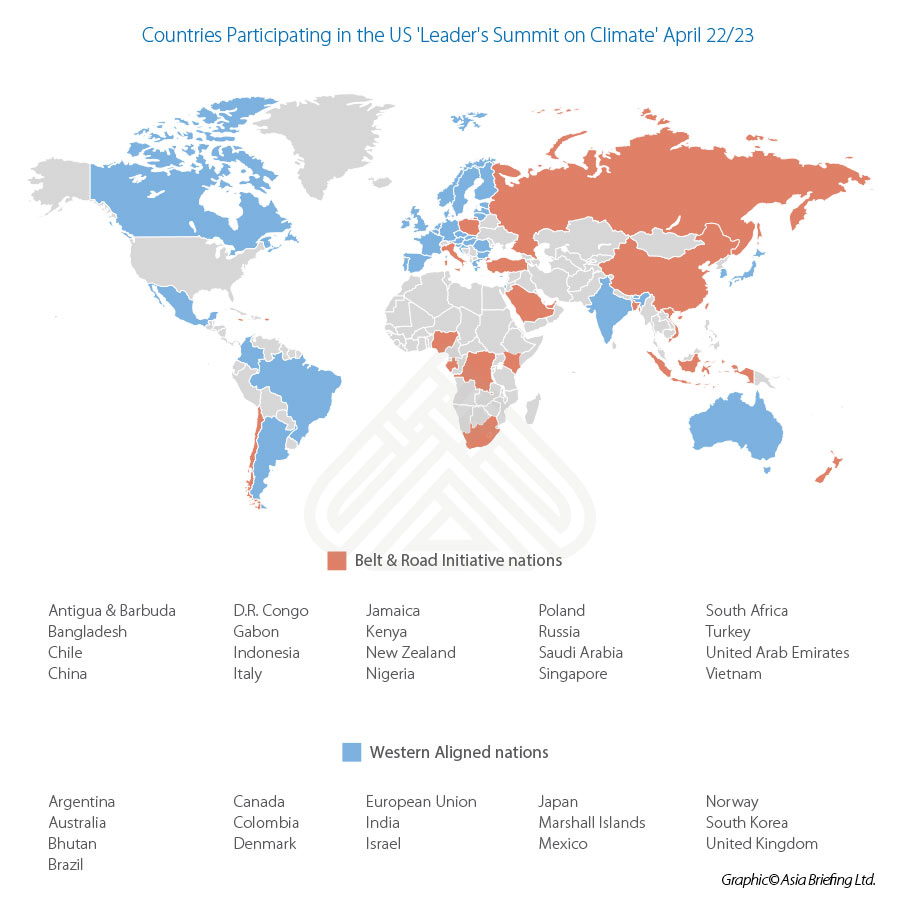Exactly 50% Of the Countries Invited to US President Biden’s Climate Change Summit Are from the Belt & Road Initiative
Op/Ed by Chris Devonshire-Ellis
- 20 of the 40 Invitations are to BRI signatories
- Potential policy change for US engagement rather than detachment over global infrastructure and climate needs.
- Follows rancorous meetings with China in Alaska
Whether by accident or design, the Virtual Summit to which US President Joe Biden has invited 40 of the world’s ‘top leaders’, 20 of them are from countries that are part of China’s Belt & Road Initiative.
Given that personally, I don’t believe such matters are left to pure chance, it is an interesting observation.
Here are the attendees, with the conference talking up two days, the 22 and 23 of April.

Given that Biden himself will be presiding over the conference, that immediately as host puts the United States in pole position. That will be welcome news too many nations and especially as the US has re-committed to the 2015 Paris Agreement on Climate Change. It also gives the new President his first true global platform from which to announce again that ‘America is back’ following the disruptive years of Trump diplomacy.
The choice of attending nations leaders does seem to provide a disparate and global overview of how global warming is affecting each country. These range from Vladimir Putin and Justin Trudeau able to discuss the Arctic, Argentina, Chile and New Zealand Antarctica, Bhutan, India, and China the impact on the Himalayas, the smaller island states of Antigua and the Marshall Islands the effect of rising ocean waters, in addition to a huge wealth of global knowledge and observations from other interested parties. It appears a well thought out guest list.
Nonetheless, the Belt & Road Initiative and the Chinese influence will remain within the room. China has made strong commitments to dealing with climate change and has begun to reject coal power. It has also begun the development of hydrogen powered vehicles and engines in addition to solar technologies.
Whether the equal guest list split between nations under Chinese influence and those tending to follow the United States is deliberate or not is a moot point. What it does show is that global wealth remains largely in the West, while the Belt & Road Initiative represents emerging markets. Is that a subtle signal to China that the United States, despite Beijing’s development, remains very much the dominant power? If so, it could signal a new approach by Washington to US-China relations, especially after the two sides recent fracas in Alaska. Is Biden too, reaching out to Russian President Putin after apparently calling him a ‘killer’ in US media a couple of weeks ago?
It could be the ushering in of a less confrontational approach, and with climate change a global issue, Biden will need to smooth feathers and get everyone onside to deal with the issue if the United States is to be seen to be serious about tackling the problem, investing and co-investing with global partners to usher in new energy resources on a worldwide scale. The formation of a global fund, bank or carbon trading mechanism would be one way to bring the major powers together. China certainly has experience in this with its recent Carbon Trading incentives and the green financing provided by the BRICS New Development Bank.
But in another way, despite all Washington’s denunciation of the BRI, this summit shows that in fact, whether it likes it or not, the United States must interact with the Belt & Road Initiative. With President Biden also recently stating he intends to develop a US lead ‘democratic’ BRI, he may have to eventually reach the conclusion that infrastructure builds, and global needs should transcend political differences and instead, take on a policy of engagement for global, rather than regional good.
Related Reading
- Xi Jinping’s Conversation with Joe Biden: US Bellicosity vs. Chinese Pragmatism – Analysis
- The Different Aspects Between China’s Meetings with the United States Last Week and Russia this Week
About Us
Silk Road Briefing is written by Dezan Shira & Associates. The firm has 28 offices throughout Asia, and assists foreign investors into the region. For strategic advisory and business intelligence issues please contact the firm at silkroad@dezshira.com or visit www.dezshira.com





